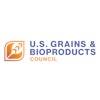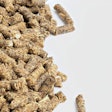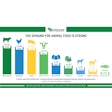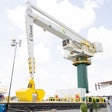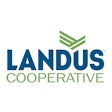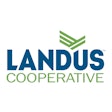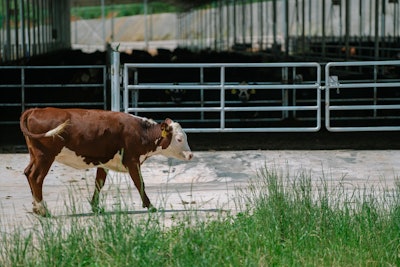
Innovative feed strategies will play a major role in efforts to make beef production more sustainable, according to a new research roadmap from the U.S. Roundtable for Sustainable Beef (USRSB). The publication, Innovation in the U.S. Beef Value Chain: A Sustainable Beef Research Roadmap, identifies feed-related technologies as critical to reducing greenhouse gas (GHG) emissions, conserving water and supporting long-term profitability for producers.
Developed in collaboration with the Foundation for Food & Agriculture Research (FFAR), the roadmap contains input on how to advance sustainability across the U.S. beef value chain from 80 experts across 50 organizations. The experts conclude that research in feed innovation is essential to meet the environmental and economic challenges facing the industry.
"This is more than just a research agenda,” said Samantha Werth, PhD, executive director of USRSB. “It's a roadmap built by and for the beef value chain. It brings together producers, industry professionals and supply chain partners around a shared vision for sustainability that's driven by innovation, grounded in science and focused on real-world impact."
Additives offer methane mitigation opportunities
One of the most urgent challenges for sustainable beef is reducing enteric methane, which accounts for a major share of GHG emissions in beef production — especially in cow-calf and grazing systems. The roadmap points to feed additives as one of the most promising tools, though the report notes there is still no consistent, scalable solution on the market.
Innovations like slow-release boluses and water-delivered additives could provide new delivery pathways in pasture-based systems. However, further research is needed to validate their efficacy and feasibility.
The roadmap also highlights the need for mechanistic studies on additive mode of action, feeding practicality and emissions impact across diverse diets and production environments.
In feedyards, large-scale trials must evaluate the total carbon, nitrogen, and energy balance of additive use — while ensuring animal health and production efficiency are not compromised.
Diet manipulation and nutritional strategies
Beyond additives, nutritional strategies offer additional potential for reducing GHG emissions. The roadmap highlights established correlations between dietary inputs and enteric methane emissions, particularly in confined settings.
Priority areas for further research include understanding how diet formulations — such as the inclusion of supplemental fats, tannins and grain processing techniques — interact with additives like 3-nitrooxypropanol (3NOP) to influence methane output.
The roadmap calls for controlled, large-scale studies that test a full range of combinations and dose responses, leveraging decades of studies from the dairy sector where more robust methane mitigation data already exist. These studies will help adapt the dairy sector’s findings with the objective of refining beef-specific feeding strategies that reduce methane emissions without compromising animal health, productivity or feed efficiency.
Water-saving feed crops
Water scarcity is another growing pressure point. The roadmap recommends further development of drought-tolerant feed crops — particularly alternative forages and grains like sorghum, millet, and triticale. These species generally require less irrigation and are better suited to dryland production systems.
Male-sterile sorghum varieties have shown promise in adapting to climate variability. The roadmap encourages researchers to focus on breeding high-yield cultivars with improved protein and starch traits, along with better digestibility and nutritional profiles.
Economic analysis is also a priority, ensuring new feed solutions deliver both sustainability benefits and on-farm return on investment.
Precision ag and weather forecasting
Precision agriculture practices also play a role in enhancing the sustainability of feed production. The roadmap calls for research into technologies that improve water use efficiency, enhance crop yields, and reduce the environmental footprint of feed inputs.
The roadmap noted one area of concern is the current gap in reliable weather forecasting tools. Greater accuracy in seasonal and sub-seasonal forecasting capabilities are needed to support more accurate management decisions, particularly in the face of increasingly extreme and unpredictable weather patterns.
Aligning industry around sustainability research
"Industry alignment around research priorities is essential to drive meaningful progress," said Jasmine Bruno, PhD, scientific program director at FFAR. "This roadmap is a powerful example of how science and collaboration can come together to guide innovation and ensure the sustainability of beef production across the entire value chain."
The roadmap stresses the importance of strong collaboration between researchers, agribusinesses, producers and technology providers, adding that research must remain focused on field-level feasibility, with cost-effective, scalable solutions that align with existing production systems.
As feed manufacturers and ingredient suppliers look to support sustainable beef systems, this roadmap provides clear guidance on where innovation and investment can have the greatest impact.

